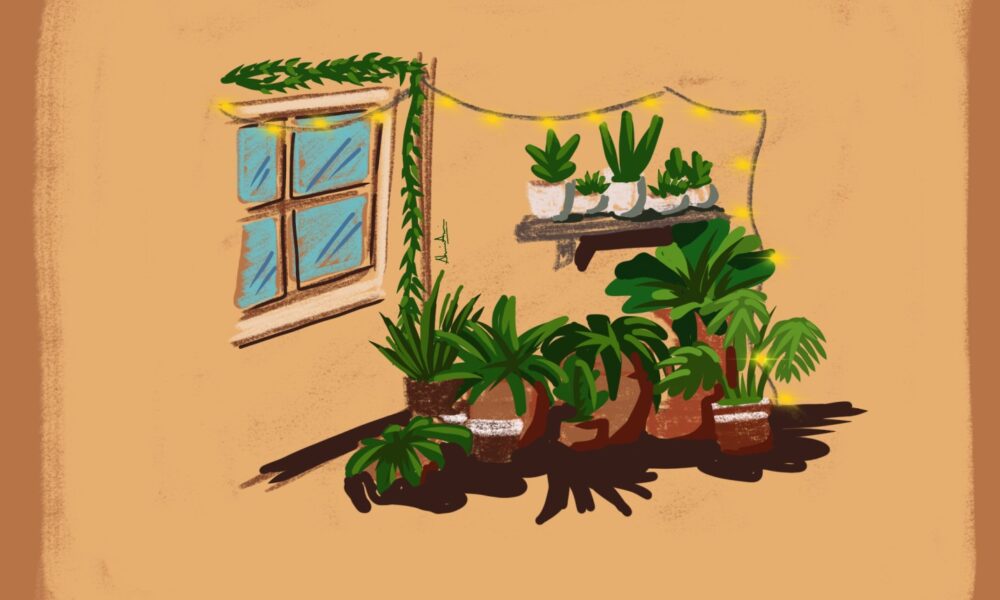A healthy indoor plant is seen as the mark of a student life well-balanced. Not only do they add a touch of colour and life to any living space, but they also provide numerous health benefits. For many McGill students, however, caring for these green babies can be a challenge. From a dearth of sunlight in cramped bedrooms to long breaks with nobody home, keeping indoor plants alive and thriving can be a difficult task. Whether you have a green thumb or are a keen beginner, read on to learn more about the benefits of indoor plants and how to care for them in your student apartment.
Benefits of indoor plants
Houseplants are an affordable way to add a touch of nature to your indoor spaces and enhance the overall aesthetic of your home. This decorative appeal prompted Eléonore Beauregard, U3 Science, to buy some houseplants for her apartment.
“They make great décor that is not super expensive and doesn’t encourage overconsumption,” Beauregard said. “When they flower, it’s the best feeling to know that I’ve cared for them so well.”
Indeed, houseplants are known to have certain psychological benefits. Taking care of living creatures, watering and fertilizing them, and removing dead leaves can be therapeutic. Caring for your plants gives you a purpose and, when they bloom, you feel rewarded.
Additionally, the bright green colours and earthy feeling that these plants produce will reduce stress levels and elevate your mood.
For Kenza Zarrouki, U3 Arts, living in a windowless bedroom has made caring for plants even more special.
“I recently purchased several plants, and they bring life into my tiny bedroom,” Zarrouki said. “This is very soothing and makes me feel much better, especially since I don’t have a window and my room can get very dark.”
Through the process of transpiration, plants also add humidity to the air, which can help combat the dryness of cold winters. They also absorb carbon dioxide and release oxygen, helping keep the air fresh.
Overcoming the challenges of student apartments
Many students find themselves in small apartments with low levels of natural light and, like Zarrouki, often do not have a window in their bedroom. This presents the biggest challenge for indoor plants that need light to grow. To combat this, Professor David Wees, Faculty Lecturer in the Department of Plant Science at McGill, recommends investing in a plant-based alternative.
“Light will always be a limiting factor. So for someone with a small apartment and the only light is a north-facing window with no direct sunlight, you might want to consider putting in a plant light,” Wees said in an interview with The McGill Tribune.
Another reason why maintaining healthy plants may be challenging for students is the limited time spent at home. Camille Lederer, U3 Environment, finds the time needed to grow most plants a particular challenge as an international student.
“When I go home for summer or winter breaks, my plants don’t survive,” Lederer said.
Thankfully, certain plant species, such as succulents, are better adapted for students in these situations, especially for those who are away for long stretches.
“Plants that people like to use indoors include the spider plant since it is easy to grow,” Wees added. “Another one is the snake plant––it is very drought-tolerant, so you can forget to water it for months and it will survive. Finally, pothos is great for low light. One thing to look out for is that it’s not as drought-tolerant, so you need to water it at least once a week.”
Once you have purchased your plant, there are some final things to keep in mind. To ensure your new plant thrives, remember to not over-water it, which can lead to root rot. Also, when introducing a new plant to a room with existing plants, it’s a good idea to place it in quarantine to prevent the spread of bugs or parasites.
With all of this in mind, you’re ready to start your own plant oasis. Happy gardening!








